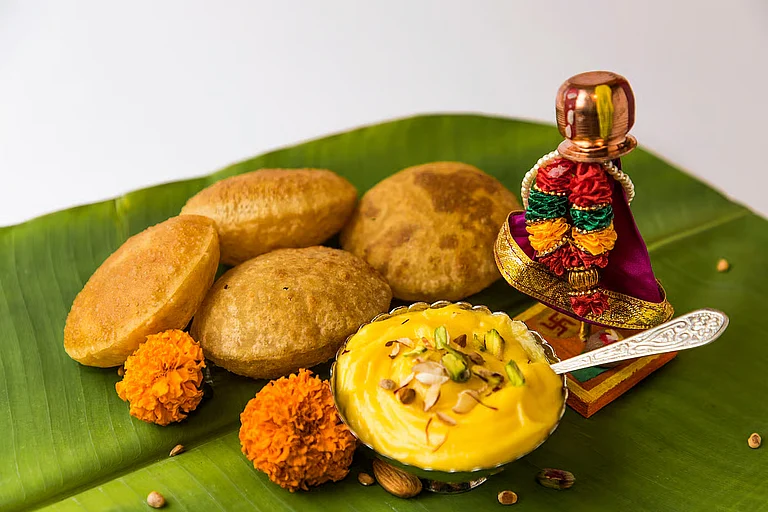Sixty-five year old Rambhau Parikh sits on a steel cot in a room with saffron-coloured walls. There is a sofa placed on the opposite side of the cot. The wall behind the door has an altar with photographs and miniature figurines of Hindu gods and goddesses. The shelf above the altar running across this wall displays a medley of trophies, presented to Parikh by several organisations in appreciation of his work as a Shiv Sainik.
Parikh says he is very fond of the saffron colour, which is evident from the painted walls of his living room.
“I have been in the Shiv Sena for the past 55 years. I will never quit this party, irrespective of which direction it is moving,” says Parikh to Outlook. Two other Shiv Sainiks sitting in the room nod their heads as if in agreement.
“I had seen the saffron flag of the Shiv Sena when I was in school and I was mesmerised by it. Then I started listening to Balasaheb’s speeches. His personality drew me to the Shiv Sena,” says Parikh.
Balasaheb Thackeray was the founder of the Shiv Sena.
“I had met my leader when he was simply Bal Thackeray. Later on as he grew in stature, he came to be known as Balasaheb Thackeray. There is no leader in India who can match the stature of Balasaheb,” reminisces Parikh.
In 1971, he was given a cycle by his father and Parikh painted the words “Jai Maharashtra”, which is the signature slogan of the Shiv Sena that was later adopted by others in the state. This made him a cynosure of all eyes and people started asking him about the slogan. Confessing that the attention had made him feel like a king, Parikh revealed he wanted Thackeray’s attention even if it was for a minute.
“I loved saying Balasaheb Zindabad. At a sabha in Pune, I, who was a teenager then, along with some friends waved the saffron flag of the Shiv Sena and kept shouting Balasaheb Zindabad until he looked our way. He waved at us. It was a defining moment for me,” says Parikh.
Since that day, whenever Thackeray visited Pune, Parikh would hang out around the housing society in Mukundnagar where the leader stayed. At one time, he even managed to get an audience with the leader. He says, “It was like meeting my God. That day I took a vow that I would remain a Shiv Sainik until my last breath.”
As he grew up, he did odd jobs that could coexist with his journey as a Shiv Sainik. Since Thackeray had extolled the Marathi youths to become self-employed instead of working for anyone, an inspired Parikh bought an autorickshaw on loan.
“My mother was completely against my political leaning. We were Marwaris who had settled in Pune. She wanted me to keep away from the Shiv Sena as it was a very aggressive party back then. There would be big arguments with her on the subject and I stayed out of the house most of the times. When Balasaheb wanted to build the party in Pune, I jumped at the chance,” narrates Parikh.

Back then when the party was focused on building the party across Maharashtra, anyone could set up a shakha or a unit of the party. The person, who set up a shakha could anoint himself as the shakha pramukh. Given this liberty, shakhas started popping up everywhere. In 1975, Parikh became a shakha pramukh, then he graduated to a vibhag pramukh and later rose to become the shahar pramukh or the city unit chief.
“Until Balasaheb’s passing away, I would always be in Mumbai on Dassera day to listen to his public address at Shivaji Park. On that day, he would spell out the programme for the following year. We would come back to Pune all charged up and eager to implement Balasaheb’s aadesh (order). Balasaheb’s Shiv Sena was much different from Uddhav’s Shiv Sena,” he rues.
Uddhav Thackeray is the present chief of the Shiv Sena and is the chief minister of Maharashtra.
Though many Marathi women were drawn to the Shiv Sena, the violent agitations kept them away. It is only after Meenatai, wife of Thackeray, started touring along with her husband did the strength of women Sainiks see an increase, said Rambhau Parikh, who has been a Shiv Sainik for the past 55 years.
“The Shiv Sena has to go back to agitational politics if it has to survive. Power in the state has mellowed us and the cadres are itching for action. Sainiks are not people who will sit on the sidelines. We need action,” says Parikh, who is an acid attack survivor. The left side of his face, a damaged left eye, and ear lobe bear the scars of the attack that took place due to political rivalry.
According to him, the moderation in the “Uddhav Shiv Sena” is because new-age Shiv Sainiks are professional politicians. They were not so in his time.
He says, “Then the Shiv Sena did not have people with money. Our leaders were very accessible. Now the Shiv Sainiks are flush with funds. So aggressive politics has taken a backseat. In today’s party, every Shiv Sainik wants a position. Back then we did not want any position. Being a Shiv Sainik was like a badge of honour for us.”
Parikh confesses that he does not expect any position in the party. He is there because of his love for the party. He believes people are needed to strengthen the Shiv Sena, a role he takes very seriously.
The years of agitations have added 26 police cases to Parikh’s political resume, denying him a passport. Speaking with pride about police cases against him, Parikh points out that present-day Sainiks are afraid of being arrested in agitations. Shaking his head, he says that the once-feared aggression of the party is now a thing of the past.
“Since Uddhav Saheb became CM, he has lost touch with Shiv Sainiks. Uddhav Saheb does not travel much. The chief ministership has not been good for the Shiv Sena,” says Parikh.






















